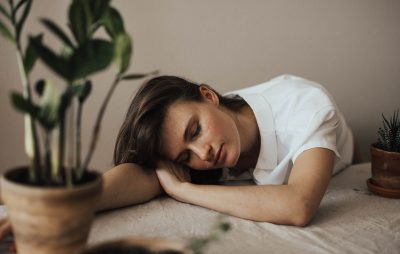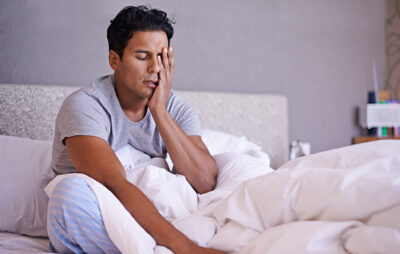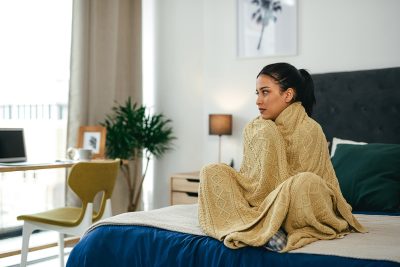Science-Backed Tips For How To Wake Yourself Up
- by Tracey L. Kelley
- Updated: August 7, 2023
Table of Contents

Some people spring out of bed, have a good stretch, and bound into the day. Others thwack the snooze button and start their coffee maker from a smartphone app while they burrow under the covers for another few minutes. Why is it hard to wake up some days, and what can we do about it?
Carleara Weiss, PhD, MS, RN, (1) is a sleep educator and research assistant professor at the University at Buffalo School of Nursing. She tells Sleepopolis that knowing how to wake up early with ease might have something to do with your chronotype, which dictates when your body naturally wants to wake up and go to sleep. “Morning people (morning chronotypes) find it easier to wake up because their biological clock is naturally set up for mornings, particularly if they need to wake up early,” she says. “Evening people (evening chronotypes) find it more challenging to wake up in the morning.”
Below, we take a closer look at chronotypes and offer helpful tips for how to wake yourself up in the morning according to your natural rhythms.
Long Story Short
- Your chronotype dictates your ability to go to sleep and wake up at particular times. It’s regulated by maintaining a consistent circadian rhythm, or internal sleep-wake clock.
- Healthy techniques, such as exercising shortly after awakening, sitting by a sunny window, and following a regular bedtime routine may make waking up easier.
- If you’re trying to adjust to a new wake-up schedule, allow approximately one week to experience initial improvements, and six weeks for more consolidated results.
Wake Up Easier: the Circadian Rhythm—Chronotype Cycle
Your circadian rhythm, or biological clock, controls how you operate best within a 24-hour period. It also influences your chronotype. (2) It also moderates the timing of your natural inclination to sleep and how alert you are when awake.
Various behavioral, environmental, and genetic factors may determine chronotypes. (3) Once you know yours, not only will waking up be easier, but your productivity may also improve. Generally, there are four chronotypes:
- Bears. They awake at sunrise and wind down at sunset. Their best wake-up time is usually around 7:00 a.m.
- Dolphins. Typically light sleepers, people with this chronotype are more prone to insomnia. Although they may go to bed late or have trouble sleeping, they still roll out to face the day around 6:30 a.m.
- Lions. Sometimes referred to as morning larks or early birds, it’s easier for lions to wake up before the sun. Their alarm is often set for about 5:00 a.m. – 5:30 a.m.
- Wolves. The proverbial night owl, people with the wolf chronotype start and end their days later than others. They usually wake up after 7:30 a.m. or 8:00 a.m.
So whether you’re an early bird, a night owl, or simply trying to avoid being an exhausted pigeon, the following tips may help you wake up more easily in the morning.
Upgrade Your Alarm Clock
Research ebbs and flows as to the benefits of alarm clocks, but most of us still rely on them to get up on time or avoid sleeping in on the morning of a big presentation. Although alarms are considered one of the more reliable ways for adhering to a schedule or how to wake up early when we need to, they don’t have to be annoying. Below are some options:
- Some sleep trackers can be set to detect your lightest sleep cycle close to your preferred wakeup time and then vibrate to gently nudge you awake.
- Aromatherapy alarms diffuse an invigorating scent in the morning, and some also offer a bedtime function to prompt more restful sleep. Scents such as citrus and peppermint may help you feel more alert, while other scents like lavender could encourage a more calming response.(4)
- Wake-up lights, available as nightstand models and as phone apps, use simulated sunlight as a cue to get out of bed, which is certainly a better alternative than an annoying buzz. Some are even built right into sleep masks.
- Try window shades you can program to open at a particular time to let in the morning light.
Skip the Snooze Button
“Hitting the snooze button is stressful for the cardiovascular system and doesn’t promote sleep quality,” Weiss says. “Those extra minutes don’t allow for a complete sleep cycle, often leading to waking up more tired or groggy as the sleep cycle was incomplete or in the middle of REM sleep.”
This grogginess you feel immediately after waking is called sleep inertia. It usually lasts 30 minutes to an hour. Other common symptoms of sleep inertia include:
- Deficits to visual attention and spatial memory (5)
- Headaches
- Impaired cognition (6)
- Poor short-term memory
- Slow reaction times
Unfortunately, research suggests (5) that repeatedly hitting snooze might actually condition your body to wake up before it’s truly ready, compounding the inertia. So try to get up the first time your alarm goes off, and use the following tips to make that wake-up call a bit less painful.
Embrace the Morning Light
To support your circadian rhythm and make waking up easier, use natural light to stay in sync with your optimal sleep/wake times. “Light is a powerful cue to the biological clock, especially in the first hour of awakening,” Weiss says. “Exposure to bright morning light helps shut down melatonin, promotes wakefulness and alertness, and boosts mood and energy for the day.”
So a sunrise alarm clock, like the options mentioned above, may be a solution. If you’re up before dawn, have breakfast near an east-facing window and watch the sun rise. Take a morning walk within the first 30 minutes of your day — or, if that’s not quite possible, slip out at lunchtime, or periodically step outside throughout the day. Artificial sun lamps may also be especially helpful to simulate exposure to sunlight. (7)
Splash Your Face With Cold Water
A brisk rinse first thing in the morning increases circulation in your face, boosts oxygen levels, and prompts more alertness. This might also be helpful when you’re slipping into an afternoon slump. (8)
Have a Little (Little!) Caffeine
Oh yes, one of the fastest tricks to get up and at ‘em is to grab a cup of coffee, tea, or an energy drink. And a bit isn’t such a bad thing, but the window in which you can enjoy it really matters, as caffeine affects your sleep in a few different ways. If you’re aiming for an easy night’s sleep, consider these tips:
- To maintain a more natural circadian rhythm, caffeine shouldn’t be consumed for at least 90 minutes after you wake up. Instead, rehydrate your body after sleeping with at least 12 oz. of fresh water.
- Consider your ideal bedtime in order to figure out when to have your last cup of coffee. The Cleveland Clinic indicates that it takes approximately 10 hours for caffeine to pass through your system. (9) So if you’re a bear who toddles off to bed at about 9:00 p.m., your last cup of joe should be at about 11:00 a.m.
- Although you might not feel it at first, too much caffeine during the day may disrupt rest later, resulting in sleep deprivation for some people.
Refreshing Caffeine-Free Drinks
Not everyone likes the rush of caffeine. Here are some great alternatives for how to wake yourself up in the morning by boosting brain activity with good hydration:
- Water
- Fruit-infused water
- Smoothies with a water base
- Nut milks, such as those made from almonds or cashews
- 100 percent fruit juices
- Caffeine-free herbal teas
Get Moving
Regular exercise improves your sleep quality, and the more rested you feel, the better you’ll perform in your favorite activity. Weiss recommends daily exercise, preferably at the same time every day, as a way to wake yourself up more naturally.
While a lion may be eager for their 5:30 a.m. jog, a dolphin might be tempted to simply roll back over. If you’re not always a morning movement person, try something in-between. For example, gentle tai chi and yoga exercises are great for relaxation. But if you practice them for 10–15 minutes shortly after you wake up, you’ll reduce morning muscle tension and stimulate circulation, both of which help you wake up more easily. Harvard University even suggests simple stretches you can do before you even get out of bed! (10)
Enjoy an Energizing Breakfast
Weiss says it’s important not to skip meals, particularly breakfast, as this is another important factor to maintaining a robust circadian rhythm. But, as a reminder, “a cup of coffee alone is not breakfast and shouldn’t be the first meal of the day,” she adds.
What do you need to nosh on to wake yourself up in the morning and avoid post-lunch sleepies? Protein and slow-releasing carbohydrates, such as: (11)
- Greek yogurt
- Cottage cheese
- Eggs, if they fit into your dietary plan
- Chicken
- Salmon
- Plant protein powder
- Tofu
- Nuts and seeds
- Chickpeas
- Whole grains, including bread and high fiber cereals
Make sure to also include a serving of fresh fruit or vegetables.
Set the Vibe with Music
Science supports using music to wind down before bed. So how do you wake up early when you don’t want to? Pump up the jams! While not widely studied, an Australian study (12) discovered that melodic sounds may help you wake up more easily and decrease the perception of grogginess. Melody, the researchers noted, “helps us transition to a waking state in a more effective way.”
So to rev up your morning routine, click on a playlist with some of your favorite singable and danceable songs.
Avoid Alcohol in the Evening
As a sedative, alcohol may make you feel relaxed initially, but its effects wear off, which interrupts sleep cycles and reduces overall sleep quality. This is why you may feel excessively tired and kind of out of it the next morning. Alcohol is even more disruptive for people with sleep disorders such as sleep apnea, insomnia, and restless leg syndrome. (13)
If you’re going to enjoy a little tipple, make sure to finish it about four hours before bedtime.
Try a Morning Breathing Exercise
Focused abdominal breathwork may be an easy way to reap some benefits. A 2018 study (14) indicated there was evidence that slow breathing may improve emotional control and psychological well-being thanks to its effect on the parasympathetic nervous system — or, the system that relaxes you after a stressful situation.
The Department of Health of the State Government of Victoria, Australia (15) additionally notes that deliberate breathing techniques also increase physical energy, improve circulation, and stimulate brain activity, among other benefits.
It takes a bit of practice to find the breathing technique that works best for you. Take your time and explore various options, like these:
- Box breathing
- The 4-7-8 breathing technique
- Mindful breath (16)
- Ten breath practice (17)
If you’d like to combine breathwork with a motivating morning meditation, many fitness apps offer combinations in durations of 3–10 minutes, which may become a new favorite method for how to wake yourself up and start the day more refreshed.
Wake Yourself Up Easier by Planning a Good Night’s Sleep
Weiss says many of us have more difficulty waking up because of social jetlag, which is a discrepancy in a person’s sleep pattern often caused by social or work obligations. (18) She adds that people suffer social jetlag especially when:
- There’s a mismatch between weekday and weekend sleep schedules.
- When they binge TV or social media or engage in other revenge bedtime procrastination habits.
- They’re using blue light devices such as tablets and phones at bedtime, which affects melatonin production. (19)
- They’re experiencing overall poor sleep quality.
So the top tip for how to wake yourself up is to understand your chronotype and maintain a regular circadian rhythm. This starts with prioritizing a consistent bedtime routine. “You have to allow time for the circadian rhythm to transition from day to night mode by giving cues that bedtime is approaching, such as reducing light exposure and promoting relaxation,” Weiss says. Even shift workers can be more mindful of their natural chronotype and wake up easier if they adhere to dedicated sleep hygiene reflective of their schedule.
Additionally, Weiss says people experiencing undiagnosed sleep disorders or mental health disorders, such as anxiety, may have difficulty waking up in the morning. So if you’ve tried all these tips before and nothing seems to work, it might be time to consult a sleep specialist.
FAQS
Why is it so hard to get out of bed?
Different reasons, including a disrupted circadian rhythm, an inability to follow your particular chronotype, and not having a consistent bedtime routine.
How do I wake up early if I’m a late sleeper?
Plan to go to bed earlier and choose an alarm clock that works for you.
How long does it take for your body to adjust to waking up earlier?
Weiss says if you’re trying to adjust to a new sleep schedule, allow approximately one week to experience initial improvements and six weeks for more consolidated results.
The Last Word From Sleepopolis
“There isn’t a one-size-fits-all guideline for improving sleep and circadian function. Understanding how your circadian rhythm works and adjusting your work, social, and sleep schedules around it as much as possible is crucial,” Weiss says. “A sleep clinician can help identify which behavioral changes benefit you the most.” Also, review the Sleepopolis Guide to Waking Up Feeling Refreshed.
Sources
- Carleara Weiss, PhD, MS, RN, sleep educator and research assistant professor at the University at Buffalo School of Nursing. Personal interview. July 13, 2024.
- Montaruli A, Castelli L, Mulè A, et al. Biological Rhythm and Chronotype: New Perspectives in Health. Biomolecules. 2021;11(4):487. doi:https://doi.org/10.3390/biom11040487
- Haldar P, Debnath S, Adan A, Jankowski KS, Chattopadhyay D,
Gopal Maity S, Moitra S, Lacy P, and Moitra S., Role of Living Conditions and Socioenvironmental Factors on Chronotype in Adolescents, Adolescents, April 2021.
- Her J, Cho MK. Effect of aromatherapy on sleep quality of adults and elderly people: A systematic literature review and meta-analysis. Complement Ther Med. 2021;60:102739. doi:10.1016/j.ctim.2021.102739
- Trotti LM. Waking up is the hardest thing I do all day: Sleep inertia and sleep drunkenness. Sleep Medicine Reviews. 2017;35:76-84. doi:https://doi.org/10.1016/j.smrv.2016.08.005
- How Should I Get Treatment for SAD? Yale Medicine.
- Mooventhan A, Nivethitha L. Scientific evidence-based effects of hydrotherapy on various systems of the body. North American Journal of Medical Sciences. 2014;6(5):199. doi:https://doi.org/10.4103/1947-2714.132935
- Cleveland Clinic. Caffeine: How Long it Lasts, How Much & Withdrawals. Cleveland Clinic. Published December 23, 2020.
- Harvard Health Publishing. Try these stretches before you get out of bed. Harvard Health.
- Harvard Health Publishing. 4 ways to boost your energy naturally with breakfast – Harvard Health. Harvard Health. Published 2019.
- McFarlane SJ, Garcia JE, Verhagen DS, Dyer AG. Alarm tones, music and their elements: Analysis of reported waking sounds to counteract sleep inertia. Provini F, ed. PLOS ONE. 2020;15(1):e0215788. doi:https://doi.org/10.1371/journal.pone.0215788
- He S, Hasler BP, Chakravorty S. Alcohol and sleep-related problems. Curr Opin Psychol. 2019;30:117-122. doi:10.1016/j.copsyc.2019.03.007
- Zaccaro A, Piarulli A, Laurino M, et al. How Breath-Control Can Change Your Life: A Systematic Review on Psycho-Physiological Correlates of Slow Breathing. Frontiers in Human Neuroscience. 2018;12(353). doi:https://doi.org/10.3389/fnhum.2018.00353
- Victoria State Government Department of Health. Breathing to reduce stress. Published 2015.
- Mindful Breathing. The Greater Good Science Center, University of California, Berkeley.
- Mindful Breathing: Roberto P. Benzo. Mayo Clinic.
- Tähkämö L, Partonen T, Pesonen AK. Systematic review of light exposure impact on human circadian rhythm. Chronobiol Int. 2019;36(2):151-170. doi:10.1080/07420528.2018.1527773
- Caliandro R, Streng AA, van Kerkhof LWM, van der Horst GTJ, Chaves I. Social Jetlag and Related Risks for Human Health: A Timely Review. Nutrients. 2021;13(12):4543. doi:https://doi.org/10.3390/nu13124543
Subscribe Today!
Get the latest deals, discounts, reviews, and giveaways!



